If you enjoy your morning cup of joe, the thought of the pros and cons with coffee for kidney disease may weigh on your mind. And trying to determine whether or not coffee is bad for kidneys may not feel like an end-of-the-world problem… if you’re not a coffee drinker. But if you look forward to your morning cup of coffee to start off your day, finding out whether or not coffee can fit into your renal diet can make all the difference in how much you can actually enjoy it!
Here we will review the nutritional components, benefits, and risks of including coffee for kidney disease.
Table of Contents
Nutrition Facts of coffee
While a cup of coffee provides no carbohydrates, fats, or protein, it does provide other nutrients. An 8-oz cup of black coffee will give you;
-
8 ounces of fluid
-
95 milligrams of caffeine
-
116 milligrams of potassium
-
a great source of antioxidants, like the polyphenol chlorogenic acid
There are also studies that show regular coffee-drinkers have lower risks for developing type 2 diabetes, liver cirrhosis and cancer, as well as Alzheimer’s and Parkinson’s diseases.
How much caffeine per day is safe?
Up to 400 milligrams of caffeine per day appears safe for most healthy adults. Over 500 milligrams of caffeine per day can result in anxiety, constipation, diarrhea, and rapid heart rate.
Interestingly enough, there has been a “U-shaped” risk curve with caffeine and hypertension. Those who drank less than one cup of coffee per week or more than three cups of coffee per day were found to have lower risk for developing hypertension.
Are there benefits to coffee for kidney disease?
Kidney Disease
For those without kidney disease, drinking coffee may prevent CKD. A 2020 review found a significant decrease in risk of CKD development in coffee drinkers compared to non-coffee-drinkers.
A study published in 2019 researched coffee consumption and kidney function. In the study, estimated glomerular filtration rate (eGFR) and albuminuria (protein in urine) were monitored. Results found that drinking an extra cup of coffee per day had a protective effect against stages 3-5 of chronic kidney disease and albuminuria.
Researchers acknowledged, however, that the reason behind this may be due to the antioxidants in coffee that may lower inflammation.
Cardiovascular disease
Cardiovascular disease is the number one cause of death for people with chronic kidney disease.
When consumed routinely, evidence has shown that 3-5 cups of coffee per day is associated with a 15% reduction in risk of cardiovascular disease.
Furthermore, drinking at the higher range of acceptable caffeine limits has not been associated with an increased risk of developing cardiovascular disease.
Type 2 Diabetes
A study published in 2013 looked at a group of over 2,700 women. Some women in the study had kidney disease and some had both kidney disease and diabetes.
They found that the women with diabetes who drank at least 2 cups of coffee per day had a lower risk in developing diabetic nephropathy compared those that drank less than one cup per day.
Recently, a review published in 2021 looked at 69 studies related to coffee and type 2 diabetes. They found that drinking coffee was tied to a lower risk of diabetes.
Type 1 Diabetes
Type 1 diabetes, characterized by the lack of any insulin in the body and a need for insulin injections, has been found to have a different relationship with coffee.
A study found that drinking 3 or more cups of coffee per day increased the risk for metabolic syndrome. Metabolic syndrome is a term for a collection of risk factors that increase risk for health conditions including heart disease and stroke.
Is Coffee Bad for Kidney Stones?
Many with kidney stones are concerned about the impact coffee may have on kidney stone formation. Coffee, after all, increases risk of dehydration. And with not enough fluid, kidney stones can form.
However, a study in 2014 found that including caffeinated beverages, including coffee, results in a lower risk of kidney stones.
There was also a review published in 2020 looking at the National Health and Nutrition Examination Surveys (NHANES) from 2007 to 2014. They found an increased risk of recurring kidney stones in those who already had a history of recurrent kidney stones. There was no increased risk found in those who reported experiencing only one kidney stone in their history.
A review published in 2021 looked over 13 studies related to both coffee and tea with the risk of kidney stones. They found that moderate coffee consumption did not increase the risk for kidney stones, “provided the recommended daily fluid intake is maintained.”
When is Coffee for kidney Disease a bad thing?
Now that we know some of the benefits of coffee related to kidney disease and common issues, when is coffee bad for kidneys? As with many different foods and beverages, there are certain aspects to pay attention to when making your next cup of joe.
Too much fluid
Fluids can still add up, no matter what type of fluid it is. A few extra-large cups can easily take you above your daily fluid needs, especially with kidney disease.
- A ‘tall’ is 12 ounces (1.5 cups)
- A ‘grande’ is 16 ounces (2 cups)
- A ‘venti’ is 24 ounces (3 cups)
- A ‘trenta’ is 30 ounces (3 3/4 cups)
If you need to follow a fluid restriction and enjoy your morning cup, be sure to factor that in to your daily fluid allowance.
Too much caffeine
Coffee has a short-term effect on increasing blood pressure. It can also cause anxiety, GI upset, fast heartbeat, insomnia, and even rhabdomyolysis (muscle breakdown).
Too much potassium or phosphorus
Coffee can turn into a high-potassium beverage if consumed in larger amounts. For example, that venti cup of coffee holds about 352 milligrams of potassium before you add in anything else.
|
Coffee Size |
Fluid Ounces |
Potassium (mg) |
|
Short |
8 |
118 |
|
Tall |
12 |
176 |
|
Grande |
16 |
235 |
|
Venti |
24 |
352 |
|
Trenta |
30 |
441 |
Information in table obtained from the USDA food database.
Canned coffee drinks can oftentimes be much worse. In fact, a 15 ounce can of Starbucks Double Shot has a whopping 1,030 milligrams of potassium (not to mention added phosphates). This can account for more than half a day’s worth of potassium for those with significant potassium restrictions!
Too much sugar
Other things to pay attention to are the extras you may put in your coffee, like flavored creamers, milk or cream and sugar. Many coffee-shop-style beverages are to blame when it comes to letting coffee become bad for kidneys, but there are ways to make sure your fast food coffee order is a good choice.
Adding too much of either of these things can increase blood sugar spikes, potassium, and phosphorus content. If these are other things you are balancing for your kidneys, try drinking coffee-based drinks more often and milk-based drinks (like lattes) on occasion to keep these concerns in check.
If you find that you do not like the taste of coffee without requiring a ton of sugar and cream, it may be better for you to research other options. Or think of why you are drinking a beverage that needs to be hidden with other ingredients.
Tips to Have a Kidney-Friendly Coffee
As stated earlier, there are benefits to including coffee. There are, however, smart choices and risky choices when it comes to prepping your cup.
Choose your milk or creamer carefully
Many coffee creamers come with added phosphates. This can be especially true in powdered creamers.
Kidney-Friendly Coffee Creamers
Check the refrigerated section to have your best pick of additive-free coffee creamers, including CoffeeMate Natural Bliss line. Even the plant-based options like Sweet Oat Milk are kidney-friendly!
Other creamers that make good coffee for kidney disease include the Starbucks Cinnamon Dolce creamer and even Silk’s half-and-half replacement.
If you prefer plain milk, you have plenty of kidney-friendly milk to choose from! Add in kidney-friendly sweeteners if you want that added touch of sweetness.
Kidney-Friendly Swaps to Cut Back on Coffee
If you feel you can’t make some of the changes mentioned above and still enjoy your coffee, here are some tips on how you can get benefits without drinking more coffee.
Energy boost
Try going for a short and casual walk around the block! If the weather isn’t nice to walk in, even some stretching and moving around the house can be a great way to get blood flowing.
If you like to be productive while you move around, try unloading the dishwasher or making the bed to start your day off right!
A soothing warm cup to hold
Need something hot to warm you up? How about starting off your day with a soothing cup of hot water with lemon, or a kidney-friendly tea like green tea? Another great kidney-friendly warming elixir is an antioxidant rich golden milk!
A peaceful morning ritual
Hoping for a peaceful way to start your morning? Start practicing some mindful gratitude meditation or gentle yoga to center yourself.
Coffee in a Kidney-Friendly Diet
For most people, enjoying a cup of coffee each morning to start their day can fit well into their renal diet. The trick, as with most parts of a renal diet, is to be sure to include your favorites in moderation.
Coffee is not something to avoid on a renal diet, but it is something to be aware of. Understand how it can affect your overall health, not just your kidney health.
Speak with your dietitian and doctor about the amount of coffee that is best for you. Each person’s kidney disease will have different diet (and coffee) recommendations. Cheers to a pleasant morning ritual!
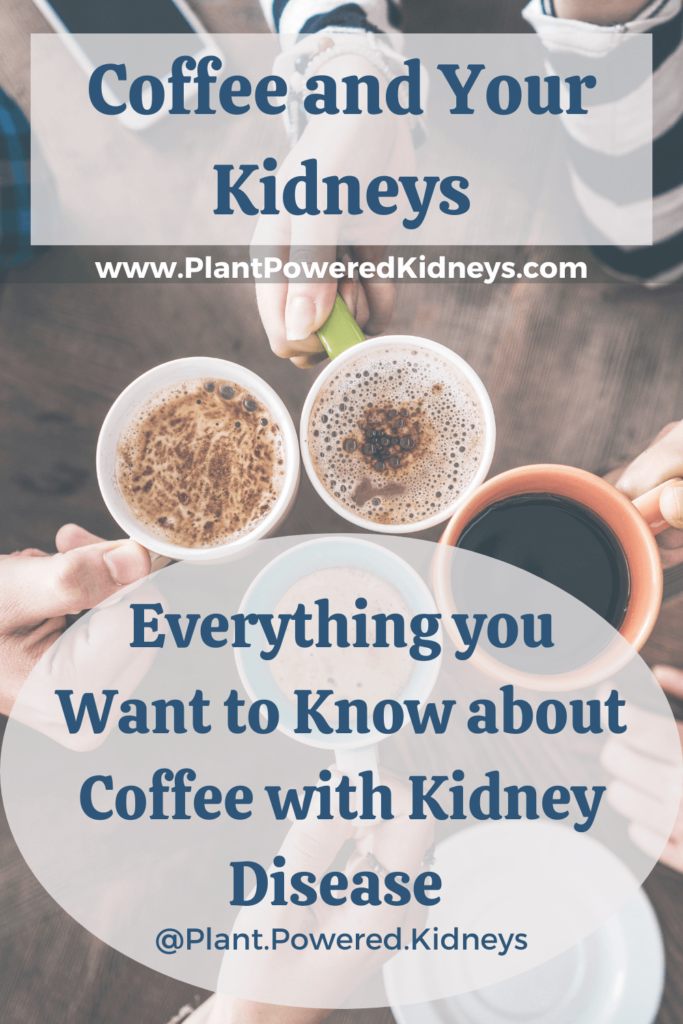

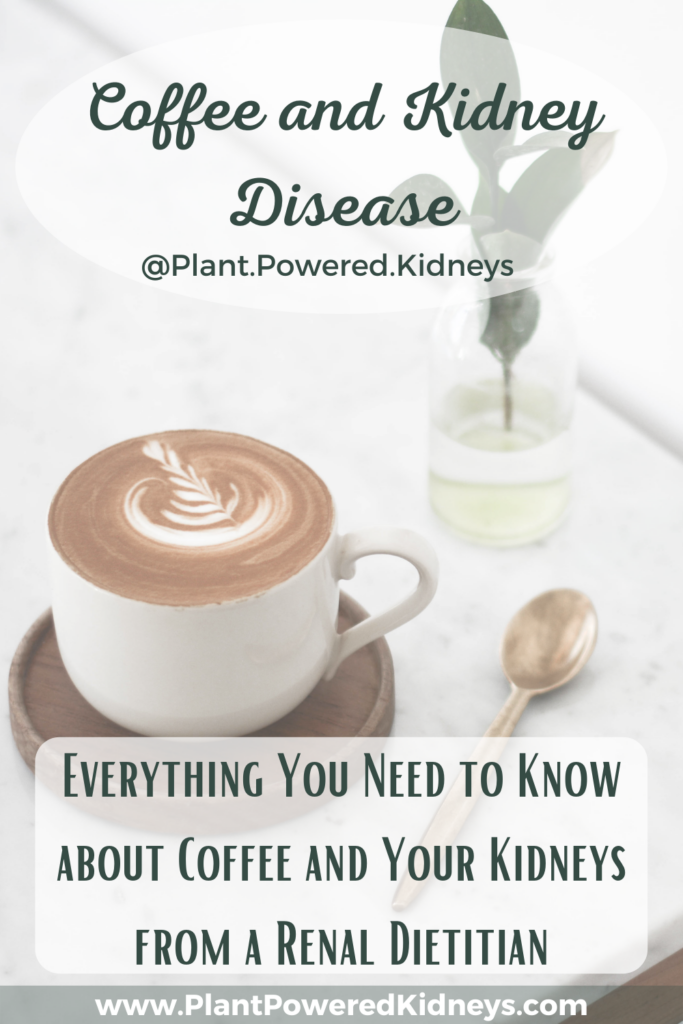
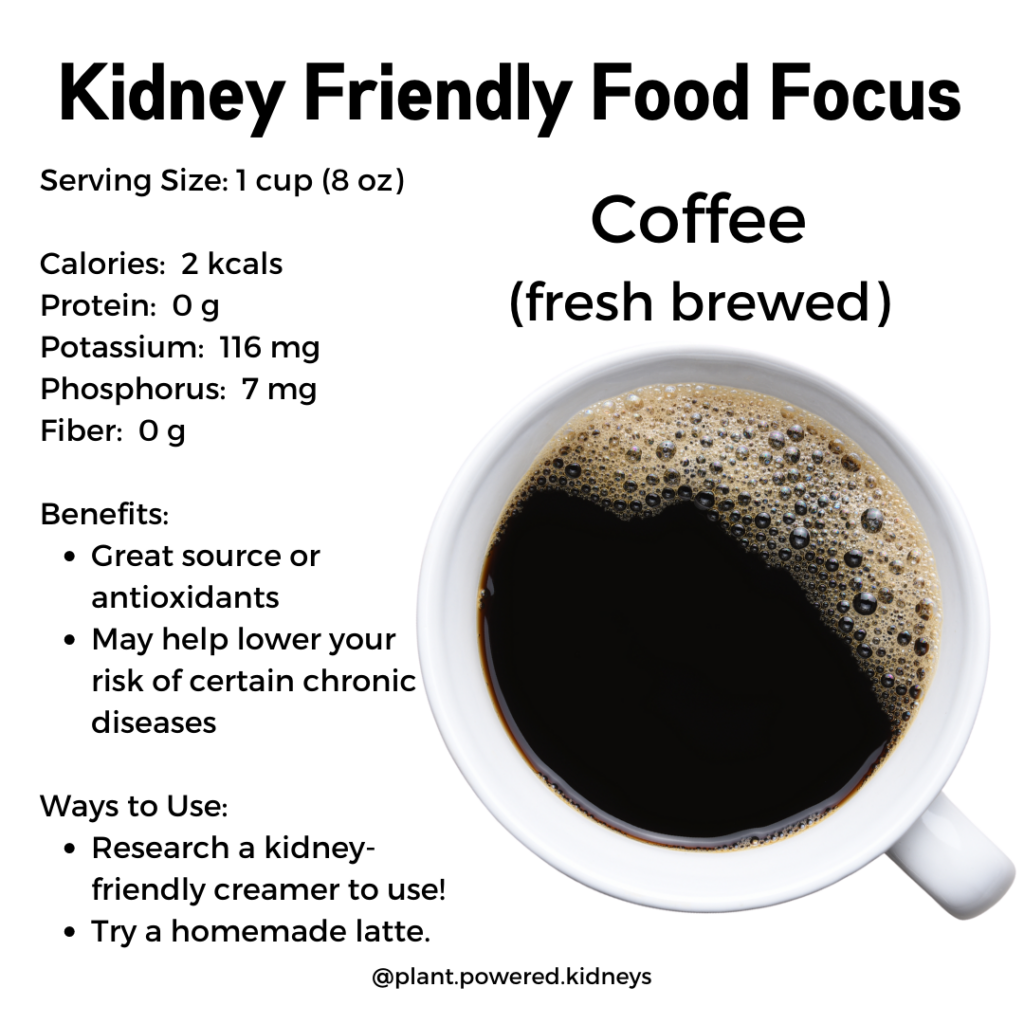
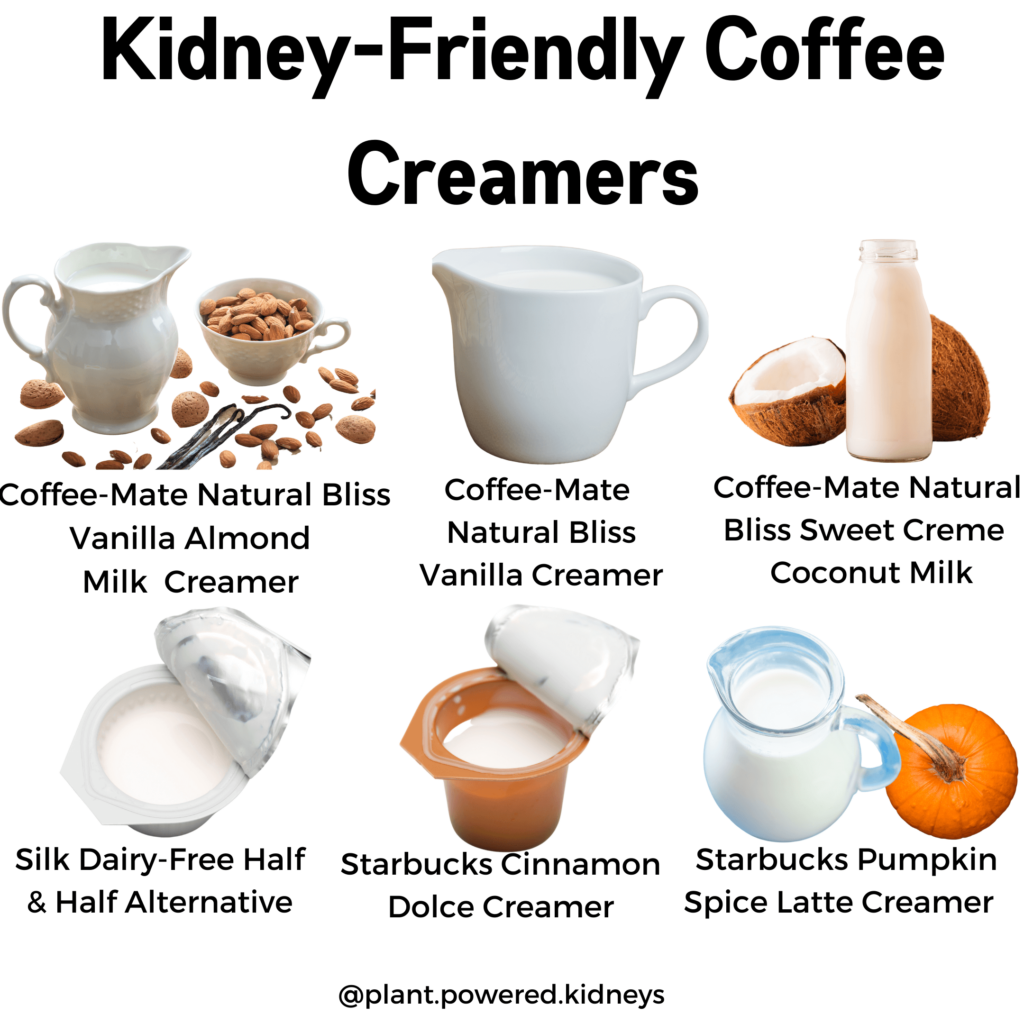
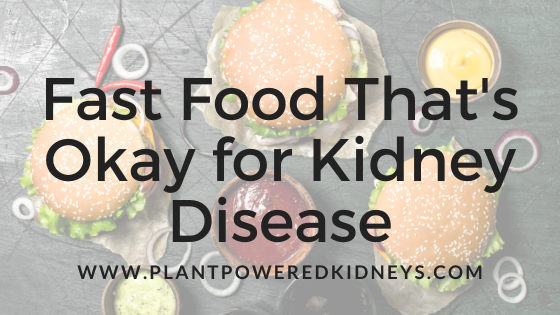
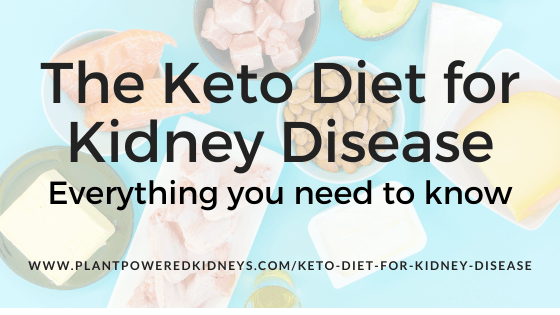
Peppermint is good if I had a liver transplant por PBC?
You’ll want to ask your healthcare team what is best for you. I can’t comment on individualized suggestions as I don’t know the whole story. 🙂
awesome list of information. thank. this is new to me. and i do love my coffee.
So glad you found it helpful, Don! Love my coffee, too! 🙂
Excellent report… was not aware of coffee is ok for CKD patients… As suggested will check with my Physician as well…
Thanks..
I’m glad you liked it, Zaheer! As a coffee fan myself, it was a joy to research and write about! 🙂
I only have 1 or 2 8 to 10 oz cups of coffee each morning. The only creamers I like are real 1/2 and 1/2 or evaporated milk. Is that ok if I avoid phosphorus the rest of my day?
It’s likely acceptable, but your labs will be the best guide for how much you can have and limit. We aren’t able to give individual recommendations or advice here simply because we don’t know enough and aren’t qualified in this setting. 🙂
No mention of oat milk here?
Have you checked out our milk article? 😉
Does green tea totally good with ckd pt.? No side effects on medicines that ckd pt take?
Hi Thess! Green tea can be a great option. Note that it still has caffeine. But if we’re talking about plain-Jane green tea bags, they’re generally good! (Be careful about bottled versions- they can have a lot of sugar plus additives.) 🍵
Very helpful information,will always refer back to these notes when buying a coffee mate and also the exercise instructions..thank you
Happy to hear it’s helped you enjoy your coffee, Ebele! 😊
Hi Jen, is decaffeinated coffee safe for stage 4 ckd patient?
It certainly can be, Norman. 😋 ☕️
Jen, Can you do an article on kidney disease and osteoporosis?
Hi Robin! I’ll see what I can do from the nutrition standpoint. Thanks for asking! 😊
Is stevia and oat milk allowed on stage 3 kidney diet? Potassium and phosphorus are within goal
check out this Blog on Milk:https://www.plantpoweredkidneys.com/milk-for-kidney-disease/
Does decaf coffee have the same benefits as caffeinated?
Yes, it generally does!